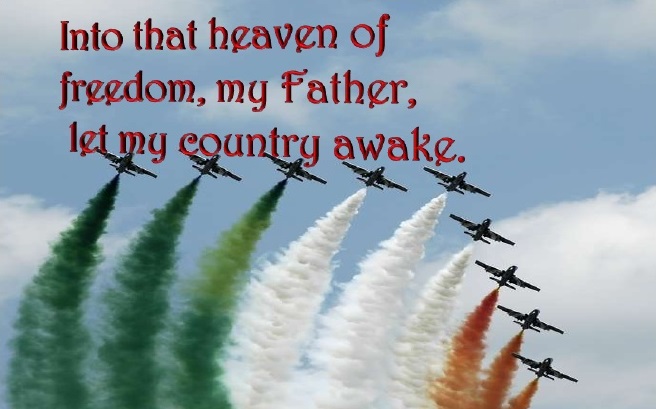Sankalp Speaks
Let My Country Awake
Posted on February 03, 2016
Indian democracy is unique in its own terms. A country inhabited by people who have migrated from across the borders transcending religion, caste, color and creed is immensely diverse and at times complicated. The landscape, the topography, the flora and fauna everything presents just a glimpse of its diversity along with richness. A nation with 1.2 billion populations with wide differences in perceptions and attitudes often leaves scope for inherent conflicts. Indian democracy over the years has been an eye witness to some grueling battles between constitutional principles and ideologies contrary to national interest. The battle though has left deep scar on its canvas but taught us lessons as well.

Parliamentary Democracy is a basic feature of Indian Constitution. The accountability of our elected representatives towards national interest and people is supreme and cannot be withheld hostage to some vested interests. However recent times have seen partisan politics and petty agendas surfacing over real issues. The entry of criminals into active politics, innumerable scams year after year with the recent addition of 2G and Commonwealth highlights the pathetic state into which our governance and control systems along with basic democratic values have gone. Governments have gone astray behaving as dictators and slapping irrational decisions on the face of public. The ever burning Kashmir issue, North East violence, Maoism and separatist tendencies, plethora of demands for separate states, mounting trade deficit with ASEAN nations, no concrete policy on population control after 64 years of independence, mad rush after white goods, environmental challenges, minority dissatisfaction with developmental programmes are just some of the issues with which the country is confronted. No doubt the onus lies on our vibrant democracy to come up with solutions that pose a threat to our integrity.
Of late, our judicial activism has played a responsible role coming heavily on unwise and atrocious acts perpetuating injustice to some section of people by legitimate but prejudiced governments. Jessica Lal murder mystery,Godhra pogrom are few examples where judicial intervention brought relief to suffering masses. The SIT appointed by Hon. Supreme Court to investigate Godhra pogrom and come out with facts as to what lead to the massacre and the people involved came up with startling revelations of state sponsored terrorism. Had the apex court not intervened timely, culprits having state backing would have unleashed another Godhra.
Similar is the case in Chhattisgarh where the state armed militant group Salwa Judum under the guise of flushing out Maoists has perpetrated untold atrocities on the adivasis. Intervention of Human Rights led by eminent Human Rights activist Binayak Sen could only secure the innocent tribals of their safety and life. Even Supreme Court in a strong note took by horns Salwa Judum and accused Chhattisgarh Government of funding the massacre.
When millions of people were still dying of hunger tones of wheat were rotting in FCI granaries. What better paradox could Indian society present???
Governments over the years have turned a deaf ear to the voice of teeming millions and denied to declare any policy for the distribution of food grains. The massive displacement of local people especially tribal’s caused by developmental projects in Orissa and other states have evoked considerable resentment leading to violent agitations. Nexus between Democratically elected government and corporate houses has sidelined the interests of the common man. Displaced from their ancestral land and denied even meager compensation less alone appropriate from the system forces this hapless lot to resort to extra constitutional measures to restore their rights. The discrimination coupled with government apathy in rehabilitating them invites wrath gradually causing erosion of belief in state machinery.
Erosion of public faith in governance and administration is fatal for the society. The role of civil society and judiciary acquires significance in such turbulent times. The responsibility is well shared by democratic institutions representing people of different professions and traits. Bringing accountability in their duty, educating Indian masses in fundamental laws and spreading awareness pertaining administrative work will enlighten the masses and will make the entire system more democratic and accessible. Values such as individual liberty, social opportunity and political voice are enshrined in the constitution but can be realized only if our systems work in tandem to uphold the same. Constitutional and statutory bodies alone cannot turn the tide.
Let us all resolve to uphold the constitutional values such as liberty, freedom f expression faith , belief and worship and create an atmosphere where every citizen irrespective of his/her class, caste and religion is bestowed with same rights and privileges to speak, to express and not only express but realizes his/her worth. The article would be incomplete without remembering and evoking Tagore’s vision of an ideal BharatVarsha:
“Where the mind is without fear and the head is held high Where knowledge is free
Where the world has not been broken up into fragments By narrow domestic walls
Where words come out from the depth of truth
Where tireless striving stretches its arms towards perfection
Where the clear stream of reason has not lost its way
Into the dreary desert sand of dead habit
Where the mind is led forward by thee
Into ever-widening thought and action
Into that heaven of freedom, my Father, let my country awake”
Posted on February 03, 2016

